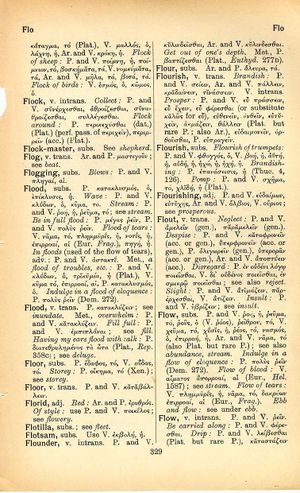flow
ὥσπερ γὰρ ζώου τῶν ὄψεων ἀφαιρεθεισῶν ἀχρειοῦται τὸ ὅλον, οὕτως ἐξ ἱστορίας ἀναιρεθείσης τῆς ἀληθείας τὸ καταλειπόμενον αὐτῆς ἀνωφελὲς γίνεται διήγημα → for just as a living creature which has lost its eyesight is wholly incapacitated, so if history is stripped of her truth all that is left is but an idle tale | for, just as closed eyes make the rest of an animal useless, what is left from a history blind to the truth is just a pointless tale
English > Greek (Woodhouse)
substantive
P. and V. ῥοή, ἡ, ῥεῦμα, τό, ῥοῦς, ὁ (V. ῥόος), ῥεῖθρον, τό, V. χεῦμα, τό, χύσις, ἡ, ῥέος, τό, νασμός, ὁ, ἐπιρροή, ἡ, Ar. and V. νᾶμα, τό (also Plato but rare P.); see also abundance, stream.
indulge in a flow of eloquence: P. πολὺς ῥεῖν (Dem. 272).
flow of blood: V. αἵματος ἀπορροαί, αἱ (Eur., Helen 1587); see stream.
flow of tears: V. πλημμυρίς, ἡ, νᾶμα, τό, δακρύων ἐπιρροαί, αἱ (Eur., Fragment).
ebb and flow: see under ebb.
verb intransitive
be carried along: P. and V. φέρεσθαι.
drip: P. and V. λείβεσθαι (Plato but rare P.), καταστάζειν (Xen.), στάζειν (Plato but rare P.), V. ἀποστάζειν, σταλάσσειν, διαρραίνεσθαι.
Met., of words: P. and V. ῥεῖν.
flow away: Ar. and P. ἐκρεῖν, P. and V. ἀπορρεῖν.
flow down: P. and V. καταρρεῖν.
flow from: lit., P. and V. ἀπορρεῖν ἐκ (gen.).
Met., emanate from: P. and V. γίγνομαι, γίγνεσθαι ἐκ (gen.); see emanate.
flow in: P. and V. εἰσρεῖν, ἐπιρρεῖν.
flow off: P. and V. ἀπορρεῖν, Ar. and P. ἐκρεῖν.
flow out: P. and V. ἀπορρεῖν, Ar. and P. ἐκρεῖν.
flow over: V. καταστάζειν (gen.).
flow round: P. περιρρεῖν (acc. or absol.).
flow through: P. διαρρεῖν (acc.).
flow with: P. and V. ῥεῖν (dat ), V. στάζειν (dat.), καταστάζειν (dat.), καταρρεῖν (dat.), μυδᾶν (dat.).
flow with a strong stream: lit., P. μέγας ῥεῖν.

